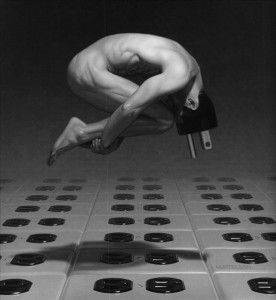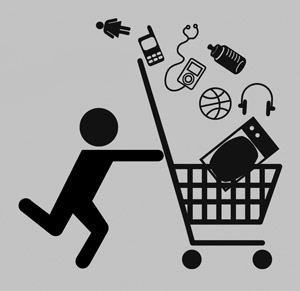 Victims of our own design: what’s the big problem with consuming things?
Victims of our own design: what’s the big problem with consuming things?
Society is in a kind of limbo state, although you wouldn’t guess it to look at it. In the past decade we’ve experienced a profound change in how we communicate, and a vast new world of networking and information has been unlocked. Politicians are still wondering how to control it, businesses are figuring out how to monetise it, and average joes like you and me are enjoying all of the perks: now we can stream Mad Men on our mobile phones, download David Bowie’s back catalogue in less time than it takes to listen to Life on Mars all the way through, and search for, purchase and begin reading War and Peace while sitting on the bus to work. It’s massively exciting.
The limbo part comes when we think on a more macro scale. Platforms for distribution are only now starting to achieve some form of standardisation and the industry struggle for copy protection still isn’t concluded. Everyone’s convinced of the value of sharing data and widening access, but there’s no single, simple way of doing it, unless you’re willing to lock yourself into proprietary systems.
Nobody except neckbearded Unix devotees really wants to care about the specifics of open/closed consumption. People want convenience and companies like Facebook, Apple and Google want to give it to them. Why shouldn’t they? The internet is a brilliant tool for this and it has the power to change everybody’s lives for the better. There’s just something that’s missing from the picture.
The convenience of giving us everything we want on a plate is like the digital equivalent of winning the lottery. The initial euphoria of receiving the massive cardboard cheque eventually fades after you buy your first mansion or luxury car. You quit your job and bask in the glow of never having to sit at a desk again. A year later and you’re sitting on your real leather couch watching the latest HD movies on your 86 inch flatscreen TV, and you’ve got nothing to do with yourself anymore.
 Artwork by Marvin Mattelson for MTV, 1990
Artwork by Marvin Mattelson for MTV, 1990
The new consumption is the same. You create a Netflix account and gasp with excitement at the endless reams of television and movies you can cram into your eyeballs. You gorge on content, watching cult classic film and 90s cartoons, wondering how they can get away with charging so little for this. There’s literally more on offer than you could watch in a lifetime!
Again: there’s literally more on offer than you could watch in a lifetime.
Why do we want all this choice, all this data? When you go to a restaurant, you don’t order the entire menu, giggling with glee as you survey the heaving tables as you decide which meal to sample first. Some of the best restaurants have brief, calculated menus, tailoring the experience and allowing some choice without it growing so large that it becomes endless, meaningless. When you sit in front of a television with more minutes to watch than there are stars visible in the sky, there’s something wrong.
In the internet’s early days, the barrier to entry was higher. At first you needed to be an academic, or possibly in the military. These early message boards and websites often picked up in activity during the autumn when new students and graduates arrived, and this was eventually exacerbated by AOL’s early movements online. ISPs offered limited webspace for customers and some early entrepreneurs set up websites offering free, ad-supported webspace. If you were prepared to struggle through the clunky interfaces, poorly-documented code and ad-infested layouts, you could take the first step of self-publishing on the internet and create something unique.
Today, it’s trivial to create a webpage. There are month-old children with Facebook pages, curated by their well-meaning parents. Born into cyberspace, these kids will see their entire lives rendered digitally. Facebook, Google and the rest have taken the power Gutenberg gave the world and removed the wealth and power restrictions, levelling publishing and communication enormously. Great, right?
The problem with this ubiquity is that it hides the inner workings; makes it less useful to understand and appreciate the construction and design. When you save up and buy a car, you’re probably going to learn about how it works under the hood, whether intentionally or not. You can be damn sure that when it breaks down, you’re going to be very interested to know what’s happening in the engine and how it can be fixed. You may not know how to do it yourself but likewise you’re probably going to develop a little knowledge about the mechanical ingenuity going on underneath the bonnet.
Conversely, when the bus into the city breaks down, you couldn’t give a damn what caused it, instead focused on getting to where you need to be. You don’t have any personal investment beyond the cost of the bus ticket and it’s not going to come back to haunt your thoughts weeks later, as you dwell on whether it was the fan belt or the carburettor. If this analogy hasn’t become too laboured, hopefully the correlation is clear: the modern consumption-driven internet is the bus: you don’t care how it works, as long as it continues to work. You’ve got no interest in finding out what makes it go, but you’d complain if it suddenly broke down.
Life is short. People seem busier than ever, perhaps as a consequence of the always-on connection the internet has given to us. Watch your friends next time one of them receives a text message or notification alert on her mobile phone. The noise will suddenly interrupt and her ears will prick up and her head will turn as she seeks out the source of the sound. Often she’ll pause whatever she was doing and get up to examine the phone, often becoming unresponsive to conversation or delayed in reply as she reads whatever the message was. Chances are you’ve done this yourself, possibly to the detriment of a real, physical conversation taking place around you at the time.
 Artwork by stickitto via Flickr (http://flic.kr/p/8k4tkv)
Artwork by stickitto via Flickr (http://flic.kr/p/8k4tkv)
Is this always-on data really worth dropping everything for, or are we conditioning ourselves to be data addicts? Wake up, check your email, go on Facebook. What are we hoping for? Some life-changing, earth-shattering status update that will change everything for someone? We’ve trivialised human communication. Think how many boring, self-indulgent, pointless pieces of information you’ve idly consumed this week. Are there better uses for this global network we’ve built?
I challenged myself a few months ago to live a ‘no consumption April’. The remit included no TV, no movies, no games, no books, no music, no anything where I was merely taking input instead of producing output. I failed, of course. I watched TV (usually guiltily over my partner’s shoulder). I went to see movies (rainy Sunday evenings, there’s little else to do). I read magazines (telling myself they were exempt anyway). I listened to new albums coming out during the month, or even old ones. Not consuming is hard.
Crucially, though, I made the effort to create. I tried to come home in the evenings from work and write something, anything. I picked up my guitar and instead of idly strumming a favourite artist’s song, I had a go at writing my own. I carried a notebook and pen with me on the tube to work and occasionally even wrote something in it, when the lure of Angry Birds wasn’t too powerful. I made this zine. [editor's note: this article was initially printed in my zine]
This isn’t meant to be preaching. Entertainment is important, all work and no play makes Jack a dull boy, and there’s nothing inherently wrong with enjoying and experiencing the work of others.
My concern today is that the brave new world of the internet and new technology has shifted the balance too far the other way. We all know how to look up an address on Google Maps on our phones, but we’re losing the ability to find our way without GPS and touchscreens. We’re comfortable relying on websites every day of our lives but not having the first idea about how to program one. We sit back and watch every US television import, not pausing to wonder if we could ever write a script or film a pilot.
The thing that I keep coming back to is brevity of existence. I’m trying to live my life with the idea that my death could be around the corner. If I got hit by a bus next week, what would be my legacy? In my dying moments as the blood leaked out of me, would I regret spending the previous evening reading Twitter updates and watching The Office? I want to unwind after a long day and I want to zone out and let my brain rest, sure. But with a lack of any clear meaning of life or endgame for being a human being, my own motivation is to try to at least achieve a 50/50 split between consuming from the ever-growing menu of media and technology, and adding a few of my own dishes to the menu.